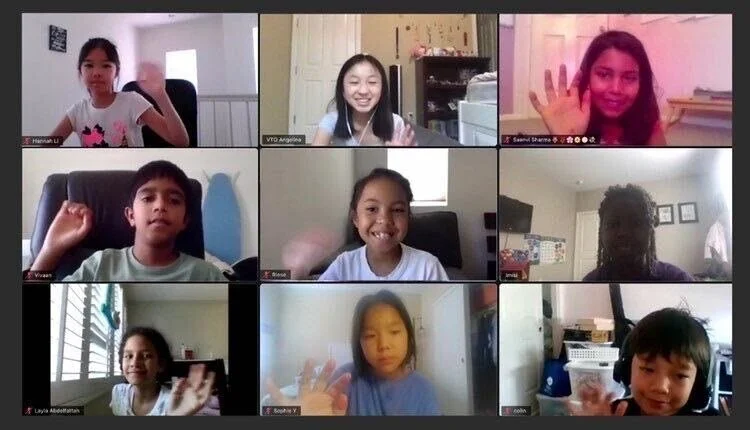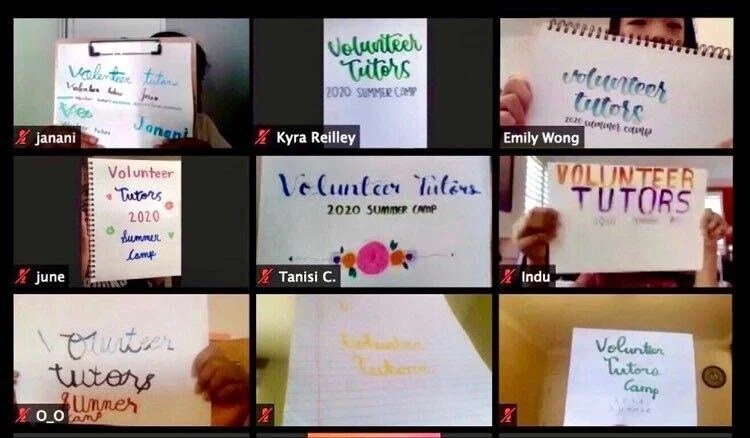The Power of Virtual Education: An inside look at rising organization VTO
By: Dana Bahng
Let’s take a look at one student-run organization that’s been staying active and innovative amidst the pandemic.
VTO, based in San Diego, CA, is a group of high school students dedicated to providing free tutoring and group lessons for K-8 students. The twist? All of it is done virtually, through Zoom, Skype, and more.
Founder Shirley Xu is a sophomore at the Bishop’s School. She began preparing for the launch of Volunteer Tutors this past spring, as schools nationwide began shutting down due to COVID-19. “I decided to start the organization to help out kids in the transition to virtual school, since they were not getting as much attention from the teacher as they were in in-person school,” Shirley said. She got to work setting up a website, creating forms and applications, and recruiting fellow student tutors for the endeavor. Now, after just several months, the group has additional branches in New York and Vancouver (British Columbia), 70 tutors from all over North America, and hundreds of students.
A wide and flexible range of topics, both academic and extracurricular, are offered: English, math, history, and science, as well as coding, foreign languages, music theory, various art classes, and more. Since this list is catered to the needs of individual students, it is ever-changing and growing. The organization matches tutor-tutee pairs by subject and schedule compatibility for one-on-one or group lessons. Times can be negotiated across different time zones, and of course, the online meetings remove the constraints of physical location.
The obvious question that follows is how in the world all of this is managed so efficiently, and how much time it takes to do so. I reached out to Shirley for the sweet details.
“Definitely can’t go without frequent meetings over Zoom and establishing everyone’s roles so we don’t step on each other’s jobs or do things more than once,” she noted. The group communicates through emails, forms and servers.
“In total, I think I’ve spent more than 200 hours on VTO. I don’t keep an exact record since oftentimes VTO feels like family / something I should take care of instead of something I have to (or an assignment that needs to be completed), so my guess may be inaccurate.” Shirley expressed that she hopes VTO will continue to expand in its reach in helping students everywhere, especially those who are underprivileged, in a wide variety of subjects.
After working with the organization for just a few months and participating as a teacher in its 2020 summer camp, I can say with confidence that VTO represents the initiative and innovation we need to persevere through this pandemic. The group synergy is awesome, and everyone is enthusiastic in doing their part. During VTO’s first-ever summer camp this year and all the trials that came with it, everyone stayed upbeat and optimistic. In August, during Week 2 of the camp, power surges due to Tropical Storm Isaias hitting the East Coast rendered some teachers without power or internet. On very short notice, others quickly volunteered to sub in for their classes during their free hours, allowing the camp to operate as planned without interruption. The collaborative effort of the team was inspiring to watch from the inside. No matter what happened, a positive, conscientious, and can-do attitude was always hanging in the (virtual!) air.
I spoke with several fellow tutors to hear about their own experiences with VTO and thoughts on virtual education as a whole. Most found out about it through social media posted by other VTO members, demonstrating the branching growth of this group. Others discovered it through recommendations from friends. I myself learned about it through an Instagram story.
I personally love teaching and learning alike and was really disappointed about quarantine removing opportunities for in-person tutoring, which I had been doing previously. So this was the perfect find! After checking out the site and its application forms, I joined in June.
Other tutors expressed similar sentiments: “I really enjoyed my experience so far! I love teaching and I think VTO provides a great opportunity for tutors and students alike,” said Alice. Another tutor, Amisha, noted, “Teaching at the summer camp was very exciting as it was something I never had done before and it felt great to help younger students academically.” She added, “I enjoy teaching as it brought a feeling of satisfaction as I was able to make somewhat of a difference in their academic careers.” A third tutor who wished to remain anonymous replied, “Yes, absolutely! I am very passionate about teaching and helping students grow academically; the experience VTO has given me has been so fulfilling.”
Moving beyond the organization itself, I asked for their thoughts on the future of virtual education and teaching platforms - especially considering the long-term effects of COVID-19 and its impact on teachers and students everywhere. This brought in some mixed responses.
Amisha expressed concerns that “Virtual education may cause students to lack motivation as they aren't in a classroom and may not be as motivated as they usually would have been”. She also mentioned that learning and teaching virtually is quite different and arguably harder than doing so in-person, and that the added stress of online learning to pandemic anxiety can be overwhelming.
I can attest to this; despite choosing the full remote learning option for school this year, the routine of waking up at 7:15 AM every morning to sit at my desk and stare at a laptop screen for 6 hours has admittedly been losing its shine. Teachers also have to deal with jumping between their virtual and in-person classes, engaging both, and small problems with audio or screen-sharing can eat up a precious 5 minutes of our mere half hour of shortened class.
“I think virtual education and teaching platforms are indeed very different from in-person learning,” the anonymous tutor remarked. At the same time, “from the tutor[‘s] point of view, it has allowed for us to develop effective communication skills and pushed us to pursue engagement and interaction.” Alice similarly stated that virtual education is vital in light of the pandemic - and that in her opinion, “face-to-face education is great, but virtual education provides countless other opportunities that are equally important for students.”
In the end, the overall consensus was realistic but optimistic. Everyone agreed that the switch to virtual education and online platforms was a great alternative learning opportunity at best, and at worst, a challenging shift that students would find easier to adjust to over time.
Shirley’s thoughts on the same prompt are as follows:
I’m really hopeful about the future of virtual education and learning platforms! Of course, virtual learning is not and probably will never be as effective as in person learning, but no matter what the future has in store for us, I’ll never forget where VTO’s roots lay and how we began on Zoom! I’m also super excited to see if VTO tutors will be able to have the opportunity to meet their students in real life, seeing they’ve never done so before and met virtually!
Regardless of where we go from here, it is both heartening and empowering to know that we have a younger generation willing to search for creative solutions and step into uncharted territory. The most important thing for us kids during this time is to have initiative - to pick up the slack if you spot something missing in the world.
If you’re interested in becoming a tutor or tutee, or sharing this with someone you know who is looking for either, you can find VTO’s website here! If you’d like to stay up-to-date on new VTO projects or programs, follow them on Instagram at @volunteer_tutors, or support the organization on GoFundMe here.


